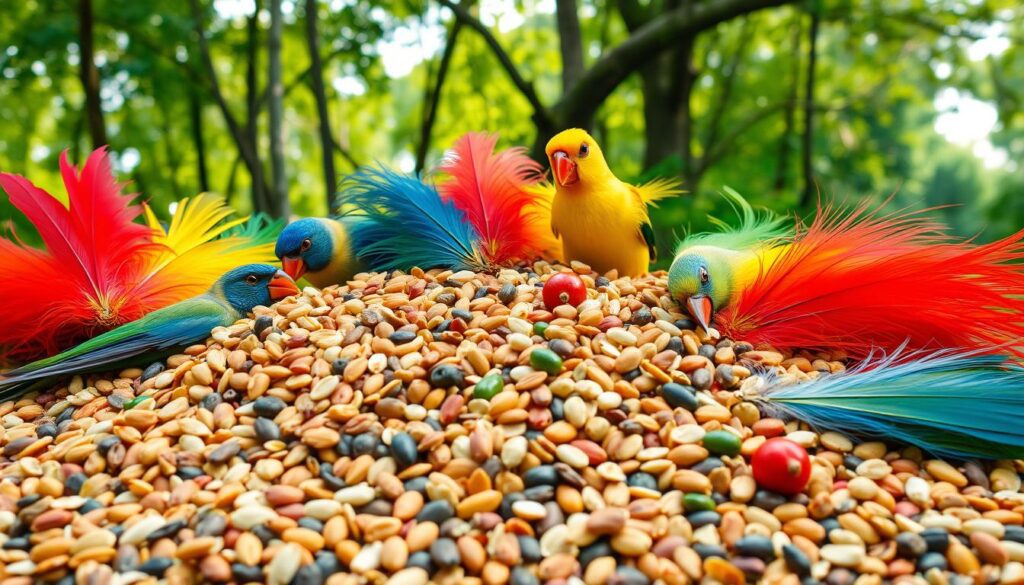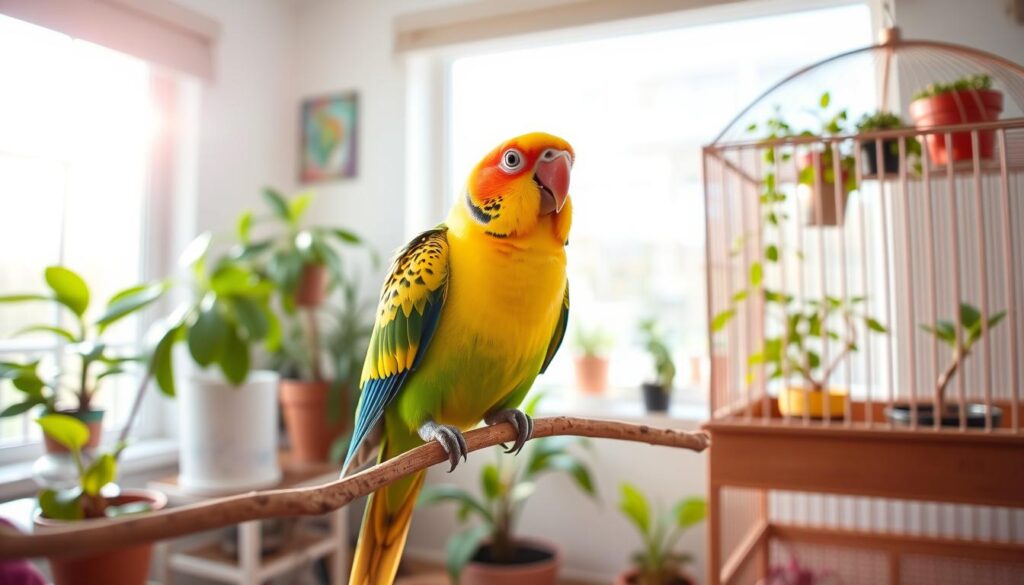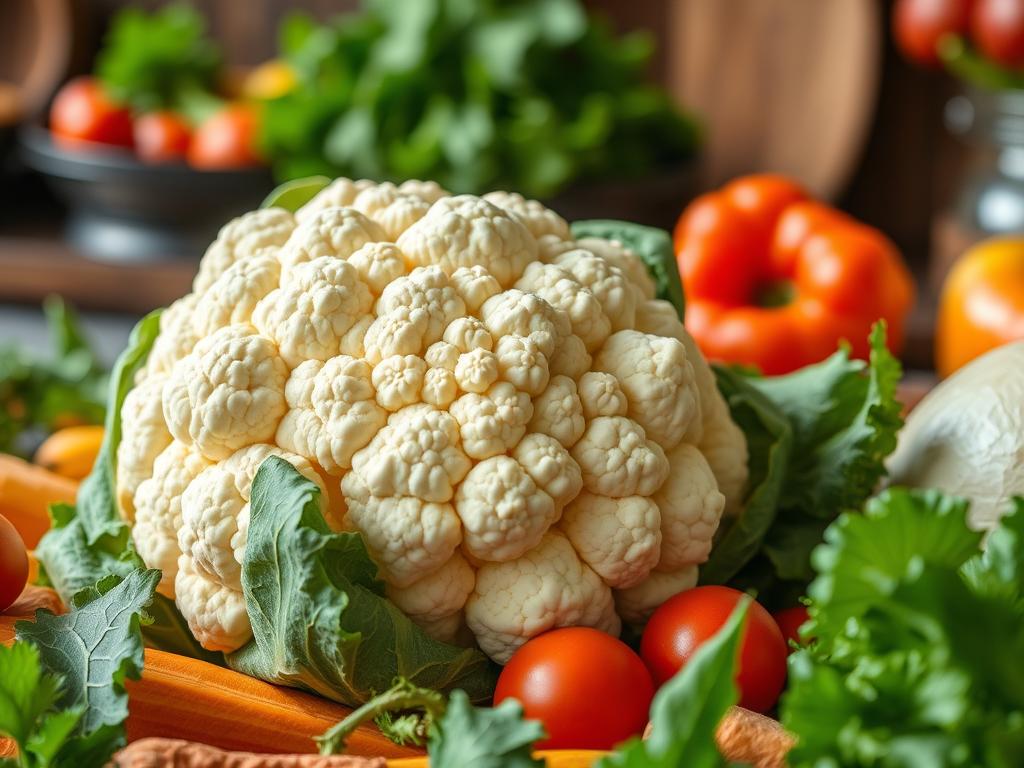Imagine walking into a room filled with the joyful chirping of your feathered friends, each bright creature showcasing their vibrant plumage. These delightful birds, much like the ornaments of nature, carry the potential for amazing health through the right kind of food. From tiny finches to majestic macaws, their beaks and feathers thrive on a carefully curated diet. Just as we learn about healthy eating for our well-being, understanding avian nutrition is crucial for ensuring that your pet can flutter and play to their heart’s content. In this article, we’ll explore the best bird food for a healthy beak and feathers, diving into how the right diet not only prevents nutritional deficiencies but also promotes glorious plumage.
With over 40 years of feeding and breeding trials, Harrison’s Bird Foods stands out as the number one veterinary-recommended certified organic pet bird food worldwide. The formulas crafted by Harrison’s cater to birds at every life stage and are packed with essential vitamins and minerals tailored to meet individual nutritional needs. Whether your bird is a young hatchling or a seasoned companion, the right diet plays a pivotal role in enhancing their overall health, leading to vibrant feathering and a robust beak. Join us as we navigate through various types of bird food that are optimal for health, ensuring your avian family members are living their best lives!
Key Takeaways
- Understanding avian nutrition is essential for maintaining healthy feathers and beaks.
- Harrison’s Bird Foods offers specialized and organic options backed by extensive research and trials.
- A well-balanced diet prevents nutritional deficiencies in birds.
- Fresh fruits and vegetables, along with high-quality pellets, are key components of a top bird diet.
- Proper nutrition supports not just feather quality, but overall bird health and well-being.
Understanding Nutritional Needs of Birds
Understanding the nutritional needs of birds is crucial for their health and longevity. Each bird species has unique requirements, but certain essentials are common across the board. A well-structured diet that includes essential vitamins and minerals, protein in bird diets, and healthy fats can significantly enhance their well-being and feather health.
Essential Vitamins and Minerals for Birds
Birds require a variety of essential vitamins and minerals for optimal health. Vitamin A is particularly important for feather growth and skin conditioning. Without it, birds may suffer from dry skin and poor feather quality. Other vitamins, such as B vitamins and vitamin D, are vital for metabolism and strong bones. A lack of these nutrients can lead to serious health problems, including deformities and weakened immune function.
Importance of Protein in Bird Diets
Protein in bird diets is a key component, especially during the molting process when birds need to regenerate feathers. Keratin, a protein, forms the basis of feathers, making a high-protein diet essential for their development. Foods rich in protein, such as legumes, seeds, and high-quality pellets, support a bird’s growth and energy needs. Neglecting to include sufficient protein can result in stunted growth and other health issues.
The Role of Fats in Feather Health
Fats play an equally important role in maintaining feather health and overall energy levels in birds. Good fats, such as those from nuts and seeds, help condition feathers and keep them glossy and healthy. A balanced diet, consisting of approximately 40% pellets and 60% plant-based foods, ensures birds receive the right nutrients for thriving and vibrant plumage. A diet lacking in fats can lead to dull feathers and decreased energy.
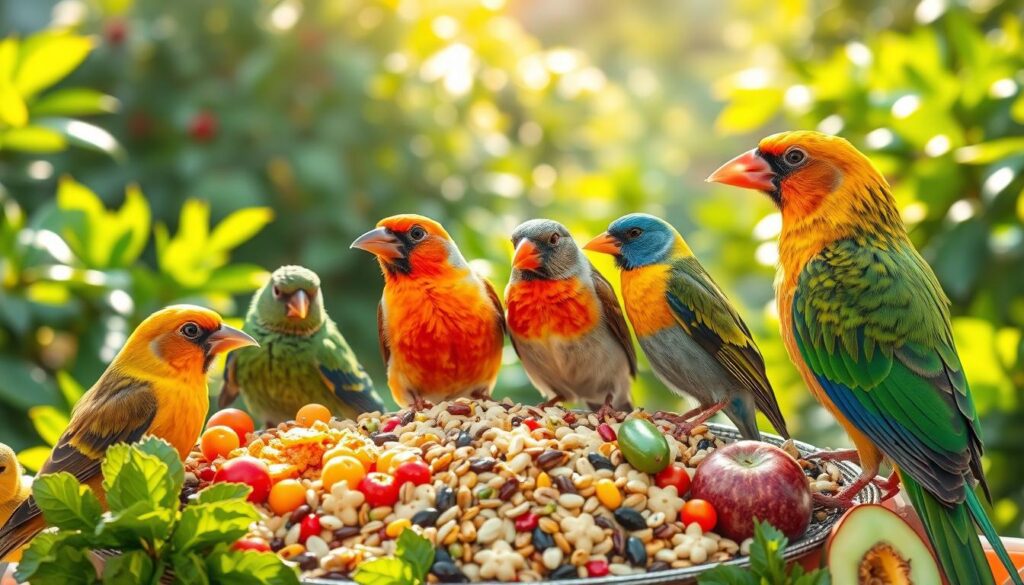
Types of Bird Food for Optimal Health
Providing a variety of food types is crucial for maintaining a bird’s health and well-being. The right selection ensures a well-rounded diet, which is essential for vibrant feathers and energy levels. Understanding the best options helps ensure your pet enjoys a top bird diet that meets their nutritional needs.
Seeds: A Staple Food Source
Seeds often serve as a primary food source for many birds, offering energy-rich quality bird seed. However, these diets can lead to health issues such as obesity and liver disease due to their high fat content. It is important to complement seed-based diets with other nutritious bird treats to create a balanced nutrition profile that addresses all dietary needs.
Pellets: Balanced Nutrition for Birds
Commercial pellet diets are highly recommended, making up about 60-75% of a bird’s daily intake. Brands like Harrison’s Bird Foods and ZuPreem provide high-quality options formulated to ensure birds receive essential vitamins, minerals, and balanced nutrition. Smaller birds, such as parakeets, typically require ½ to 1 teaspoon of pellets daily, while larger parrots may need 2 to 5 tablespoons, depending on their size.
Fresh Fruits and Vegetables
Fresh fruits and vegetables are vital components of a bird’s diet, contributing hydration and essential nutrients. Safe options include apples, bananas, berries, and leafy greens, making up about 25% of their total intake. Incorporating these fresh foods enriches the overall diet and supports optimal health, allowing for a diverse and nutritious feeding experience. For ideas on diverse destinations to enjoy while supplying your feathered friends with the best food, check out some great places to visit.
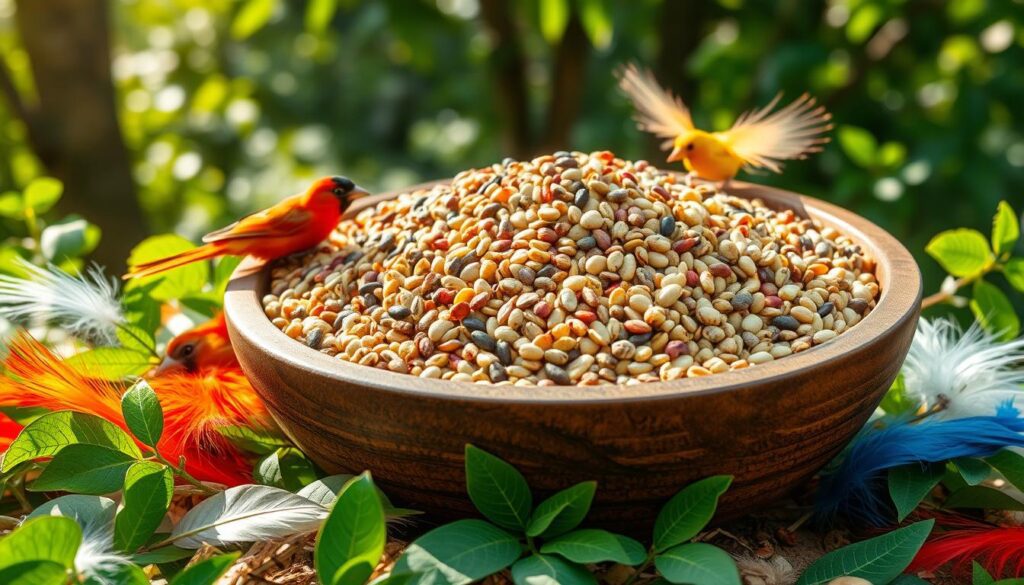
How to Choose the Right Bird Food
Choosing bird food effectively enhances their health and happiness. Many factors come into play, including the specific needs of different bird species, their age, and overall health status. Finding high-quality products with complete nutritional profiles is crucial. Awareness of ingredients is vital to ensure that what you feed your bird contributes positively to their well-being.
Factors to Consider When Selecting Food
When selecting food, consider the bird’s species and dietary preferences. Each species has unique nutritional requirements, often influenced by their natural habitat. For instance, birds requiring higher fat content, like those in colder climates, benefit greatly from seeds such as black-oil sunflower. This type of seed is a preferred choice for its thin shell and high fat content, making it easily accessible to many birds. Observing your bird’s behavior can further guide your choices, as some may show a preference for certain food types over others.
Reading Labels and Understanding Ingredients
Reading labels is essential when choosing bird food to avoid unhealthy fillers and harmful additives. Look for products labeled as organic or non-GMO to ensure quality. The ingredient list should prominently feature beneficial seeds and grains rather than low-value fillers like red millet or golden millet, which often go to waste in birdseed mixes. Some bird health supplements can fortify your bird’s diet, providing added nutrients. Focusing on these aspects when reading labels will help you provide a nutritionally sound diet for your feathered friend.
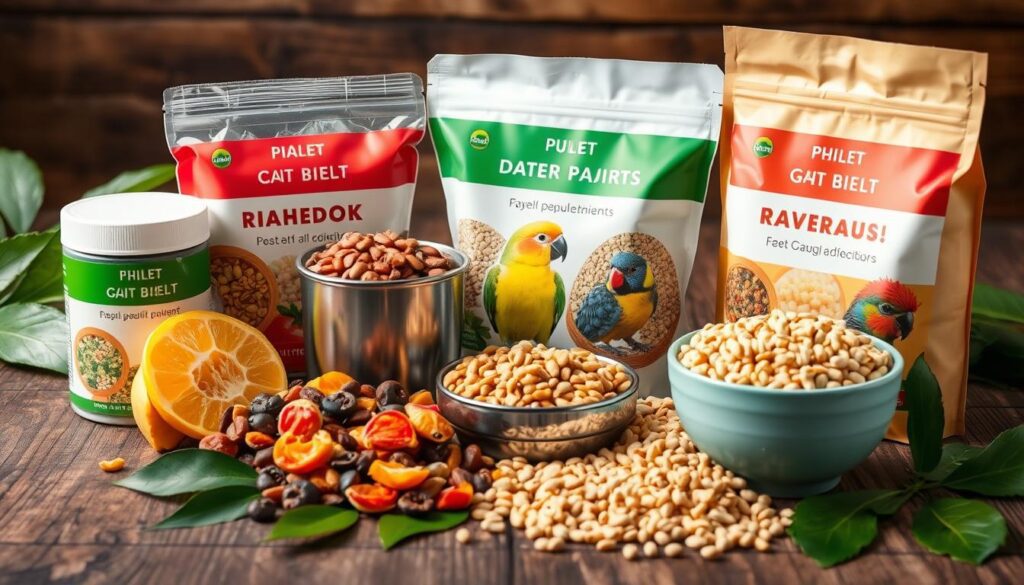
Benefits of Homemade Bird Food
Creating homemade bird food provides a range of advantages such as optimal freshness and customized nutrition. Whether you aim to support vibrant feathers or to meet specific dietary requirements, homemade options stand out as an excellent choice for pet birds. With various simple recipes available, bird owners can create meals that not only capture your pet’s interest but also contribute to their wellbeing.
Easy Recipes for Nutritious Bird Meals
Starting with homemade bird food allows you to mix fruits, vegetables, grains, and protein sources. A popular recipe includes a combination of chopped apples, carrots, and leafy greens stirred into a base of cooked quinoa. Such nutritious bird meals provide essential vitamins and minerals crucial for their health and vitality. Experimenting with different combinations keeps your bird engaged and excited at mealtime.
Ingredients to Include for Healthy Feathers
Focus on ingredients rich in vitamins A and E along with beneficial fats to promote healthy feathers. Including items like cooked eggs offers necessary protein, while seeds such as hemp and chia contribute healthy fats. Incorporating leafy greens brings an added layer of nutrients, making your homemade creations perfect for enhancing feather quality. Choosing these varied components proves vital for maintaining a vibrant appearance and strong health in your feathered friends.
Tips for Storing and Preparing Homemade Food
To ensure the best quality of homemade bird food, store it in airtight containers in a cool, dark place. This method keeps the food fresh and prevents spoilage. Preparing small batches allows you to maximize freshness while providing your bird with the best nutrition possible. Regularly rotating ingredients keeps meals exciting and diverse, aligning with your goal of offering nutritious bird meals for the active and happy life of your pet.
Common Misconceptions about Bird Feeding
Understanding the nutritional needs of birds is essential for promoting their health. Many bird owners fall prey to bird feeding myths that can negatively impact their pets’ well-being. Misconceptions regarding a bird’s diet can lead to dietary deficiencies and health issues over time.
Myths vs. Facts: Debunking Bird Food Misunderstandings
A prevalent misconception is that seeds alone are adequate for a bird’s diet. While seeds may be enjoyable, they lack nearly 20 essential nutrients, leading to inadequate nutrition. An all-seed diet can result in deformities in feathers, excessive growth of beaks and nails, and create a risk for diseases like hepatic lipidosis. Brands such as Hagen and Kaytee provide formulated diets recommended by veterinarians, promoting adequate bird health. Transitioning to a balanced diet should occur gradually to ensure adjustment.
The Impact of Overfeeding on Bird Health
Bird health can also be compromised by overfeeding. Many owners believe that giving their birds unlimited food ensures they are well-nourished. This misconception can lead to weight gain and related ailments such as atherosclerosis. Birds that are too dependent on high-fat seeds may develop serious health issues, including fatty liver disease. Implementing a structured feeding routine with diverse food options will encourage better dietary habits and help control weight.
Tips for Maintaining a Healthy Bird Diet
Maintaining a healthy bird diet is crucial for ensuring your avian friend thrives. Start by evaluating your bird’s dietary needs, keeping in mind factors such as age, species, and activity levels. Each bird comes with its own set of nutritional requirements, and understanding these is the first step toward providing a balanced diet that includes a variety of foods. For optimal health, pellets should constitute a significant portion of their diet, complemented by fresh vegetables that provide essential vitamins and minerals.
Evaluating Your Bird’s Dietary Needs
Regular monitoring of your bird’s health and behavior can reveal valuable insights into their nutritional status. Keep an eye on their beak condition; overgrown or misaligned beaks can indicate nutritional imbalances. By observing their feeding habits and preferences, you can make informed decisions about dietary adjustments. Incorporating a rainbow of vegetables, fruits, and grains will help ensure they receive a wide range of nutrients vital for their well-being.
Monitoring Your Bird’s Health and Behavior
As seasons change, consider making seasonal diet adjustments to align with the fluctuating availability of fresh foods. Offer a variety of fresh foods daily to keep your bird’s diet appetizing and prevent spoilage. Foods like leafy greens, carrots, and bell peppers are excellent for maintaining energy levels and reinforcing a vibrant feather coat. Remember, providing chew toys and perches can assist in keeping their beaks healthy and trimmed, promoting their overall hygiene. For more detailed dietary recommendations, consult with a veterinarian to ensure a tailored approach.
Adjusting Food Based on Seasonal Changes
As you adapt your bird’s diet throughout the year, be sure to include low-sugar fruits, such as berries and apples, in small portions. These treats can be a delightful addition that supports their health without overwhelming their digestive system. Keeping track of these dietary habits not only strengthens your bond with your feathered friend but also significantly boosts their immune system and overall health. For supplementary information related to bird care, exploring insights on a reputable site like maintaining a healthy bird diet can be beneficial.

